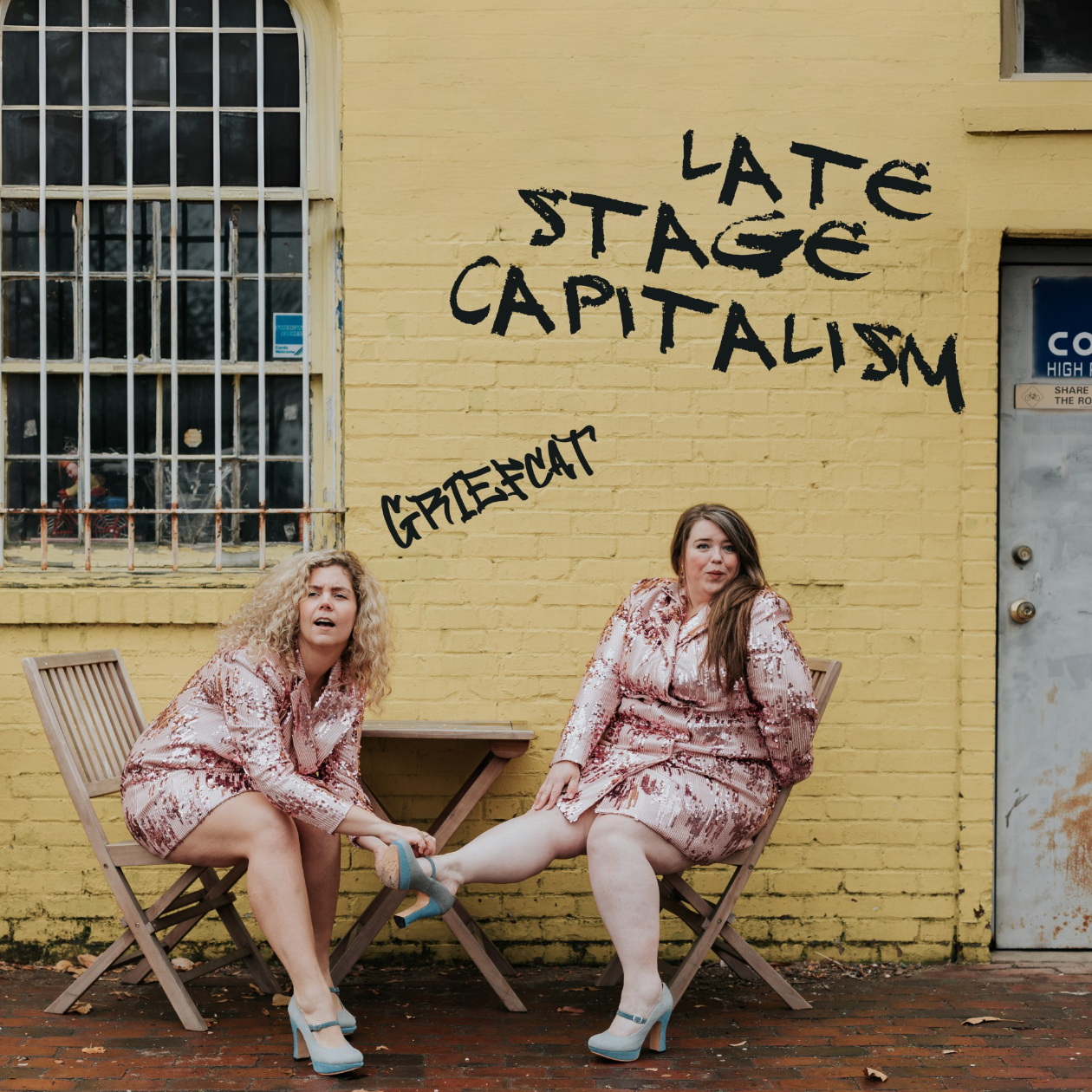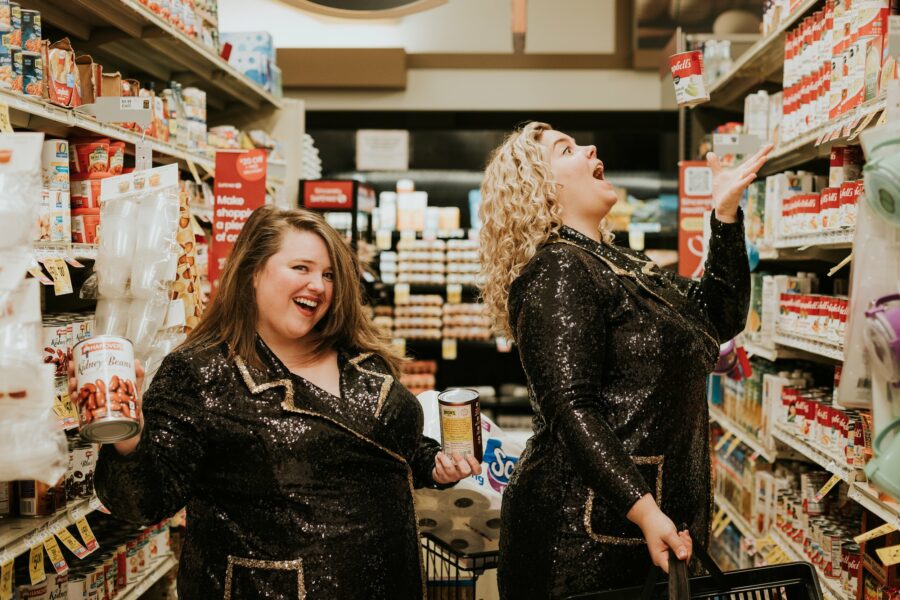
After meeting at a DC-based variety show in 2015, Annie Nardolilli and Louisa Hall quickly realized they had a lot in common despite their drastically differing backgrounds. With the two working in high-stress level jobs, Louisa as a tech employee and Annie a now-former sheriff’s deputy, an amalgamation of frustration, mistreatment, and most importantly a humorous outlook coalesced into Griefcat, the duo’s comedic musical group. After a self-titled album release towards the beginning of 2020, Griefcat quickly gained traction for their ability to balance commentary, humor, and relatability in catchy rhythms and melodic harmonization. Their second album Late Stage Capitalism, releasing April 19, has already received praise and many laughs for singles “Revolution (Poop At Work)” and “Cryptobro”. Their next single releasing march 29, “Love The Sinner,” features a personal story from Annie with the group’s classic sardonic spin. With each new song, Griefcat introduces new elements of comedy. The group prides themselves on their ability to propel their music and message in new directions blending countless genres and styles with unapologetically inspired lyrics, paying crucial attention to the mishaps we endure every day. Committing themselves to weaponizing laughter and friendship as a means to cope and as a way to connect, Griefcat throws away formulas by staying true to their eccentricities and helping others discover the hilarious ironies and contradictions in life.
Credit: griefcat.com
Q. “Love The Sinner” is the latest single released from your upcoming album Late Stage Capitalism. Talk about how you weaponized the negativity of true events to inspire this track.
Annie: The idea for “Love the Sinner” came when I was working as a deputy sheriff for a department that had a very good old boys club mentality. I got ostracized for standing up against a coworker who was making racist comments about how another deputy dressed. As my supervisors and many coworkers turned their backs on me, I turned to music to cope! Luckily Louisa was more than willing to vent my frustrations with me and it turned into the song you hear on the album!
Louisa: Annie was having a really tough time in a very toxic environment, and I think this song was very therapeutic for both of us to write! You don’t always have the power or privilege to speak up in a work scenario, so this was our way of processing emotions and experiences and finding a little joy and solidarity in the meantime. And, I think a lot of folks relate to this, too! Dealing with someone self-righteous and terrible is unfortunately a universal experience.
Q. A lot of music today references capitalism and its damaging impact with subtlety but this album is coming right out and saying it. What is the effect of this choice?
A. Annie: Well, we don’t do things with a lot of subtlety! Who has time to sift through poetic metaphors about economic injustice when you can come right out and say what we all feel?
Louisa: We are all somewhat powerless against the machine, so we may as well laugh at it! I think putting a comedic spin on a very real and damaging issue is a way of taking a little power back. It’s also a way to cope, survive, and feel some catharsis and joy. We hope that audiences relate to these songs but can also find some escape in them!
Q. You’re both string players, but there’s a variety of instruments that can be heard throughout the album from ukulele, cello, and violin, to extending to the brass family with trumpet and trombone. How did you go about incorporating an eclectic range of sounds?
A. Louisa: We love playing with a band when we can! One of my dreams is to play with a symphony orchestra. The beauty of being in the studio is that if you can dream it, you can make it happen. We collaborated with our producer on the vision for each of the songs, and how we wanted to bring them to life on the album, then we brought in the musicians to make it happen. It’s truly a genre-bending album! “Revolution (Poop at Work)” has a classic, 1920’s feel, and we even brought in an authentic old-timey drum kit to help get that vintage sound. “Sponsor Us” is heavily influenced by Meat Loaf, and “I Just Want to Get Inside (Your Bank Account)” has a very 90’s alternative feel. “Carbon Footprint” brought our punk dreams to life. Some songs, I’m not even sure what the genre is, but I love every one of them. We are lucky to have great relationships in the DC music scene, so we’ve been able to pull in some wonderful musicians and collaborators on the album.
Q. You both come from diverging backgrounds. How important is it for us to form meaningful bonds despite our differences?
A. Annie: Forming relationships with those outside of your normal sphere of influence seems to be a lost art. Diversity is vitally important to being creative and opening up oneself to new possibilities! I love working with Louisa and bringing our pasts together to forge a new future.
Louisa: Annie and I are different in a lot of ways, but at the core, we share a lot of the same values. Annie helps me learn, and she’s helped me become a bolder, better, person.
Q. The harmonies and clever, quippy lyrics you weave into all your songs might remind listeners of a satirical, comedic musical, e.g. The Book of Mormon and How To Succeed in Business Without Really Trying. Would you ever consider writing a musical?
Annie: Totally! Writing a long-form story would definitely be outside of our comfort zone but anything is possible.
Louisa: I LOVE THIS IDEA! We haven’t talked about it, but I think it would be so fun to do someday!
Q. Louisa, did working in the tech industry help aid in the lyrical craftsmanship for hilarious songs “Cryptobro” and “Benevolent Billionaire?”
A. Louisa: Surprisingly, it didn’t! Cryptobro was very much an Annie special. The original idea was around going on a date with someone, and then finding out they were into crypto. Benevolent Billionaire sprouted mid-rehearsal from thin air, and we loved the idea of an 80’s charity single sound and video. My tech career did initially inspire “I Just Want to Get Inside (Your Bank Account)” in some ways though. I was working at a cybersecurity company, so data privacy was on my mind! We started playing around with the concept in a rehearsal, and the song was quickly born.
Q. Annie, you’ve described Griefcat’s musical energy as “like if Taylor Swift, Dolly Parton, and Bo Burnham met up at an Olive Garden and wrote a song while eating unlimited breadsticks.” What does each of these artists mean to you and Griefcat as a whole?
A. Annie: I’d like to amend my previous statement! I feel like we have a new trio of musical influences! Bo Burnham makes comedy music that sounds first and foremost like music! He also has an edge to much of his recent work. We definitely take a lot of cues from him. The music Meatloaf made is dramatic and epic. Again, we don’t do anything with subtlety! Lucius is also an obvious influence. Matching glamorous outfits and killer harmonies? Sounds a lot like us.
Q. It’s so easy to be worn down by the myriad of issues overcasting our world. How does having a humorous attitude help not only your art but your ability to cope as well?
A. Annie: We are not the first nor the last comedically-minded people to turn pain into humor! Creativity has been how humans cope since we started commemorating our lives in cave paintings. Humor just seems to be an effective way to communicate similar feelings with as many people as possible!
Louisa: Music and laughter are both healing forces and great coping mechanisms too. When I am singing and performing with Annie, I’m at my most joyful.
